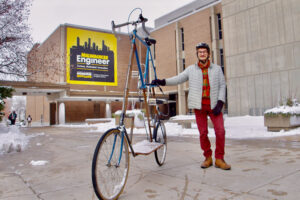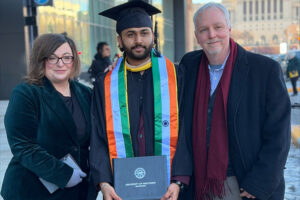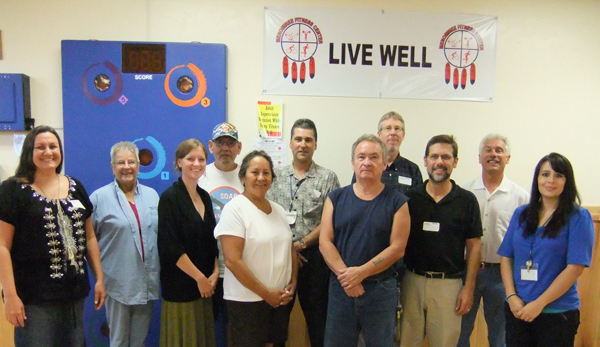
American Indians have the highest rate of cigarette smoking in the United States, yet minimal research has been done on ways to help those within these communities quit smoking.
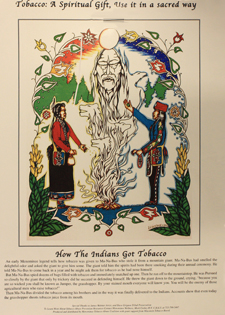
Leah Arndt, assistant professor in the Department of Educational Psychology at the University of Wisconsin-Milwaukee, has been closely involved in a two-part study designed to “provide deeper understanding of how to integrate Indigenous Ways of Knowing with mainstream smoking-cessation treatment.”
“Rates of addiction to commercial cigarettes are disproportionately high in many tribal communities that often have limited cessation and other treatment resources,” says Arndt. “This can lead to significant health disparities that result in high rates of smoking-related diseases and deaths.”
UWM’s School of Education collaborated with UW-Madison and the Menominee Indian Tribe of Wisconsin on the community-partnered Stop Tobacco Abuse, Renew Tradition (START) project from October 2008 through October 2011. Arndt was co-principal investigator on this clinical study, which tested standard smoking cessation treatment within the Menominee Tribe, and evaluated a culturally appropriate, evidence-based smoking cessation intervention for American Indians. Principal investigator was Stevens Smith, associate professor in the UW School of Medicine and Public Health, which was the primary funder for the START study. Smith is also a senior investigator at the UW Center for Tobacco Research and Intervention.
Arndt is also serving as principal investigator on a National Institutes of Health (NIH)/Mayo Spirit of EAGLES qualitative pilot grant that started in September 2010 and will run through August 2013. That study uses the information from the START project to provide insight into factors that either support or constrain participation in clinical trials within American Indian communities.
Tobacco plays complex role in culture
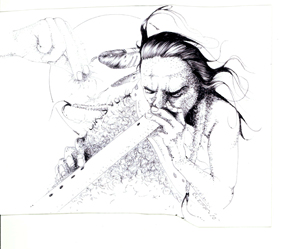
Dealing with smoking among the Menominee and other tribes is challenging because of the role tobacco use plays in the culture and in traditional ceremonies, says Mark Caskey, wellness director of the Menominee Tribe.
“The proper spiritual relationship with the gift of tobacco needs to be re-established,” he says. The tribe is well aware of the health dangers of the abuse of tobacco and smoking addiction, Caskey notes, but while the tribal clinic has made strides in reducing abuse of tobacco, much work still needs to be done. “In the last five years, cancer has passed heart disease as the number one killer of Wisconsin American Indians, and, in the Menominee, lung cancer is the leading form of cancer.”
Though Arndt was invited to work on these grants as a qualitative researcher, given her Métis heritage, she also has an interest in helping with the project because of the unique nature of tobacco use within American Indian communities. “We view the use of tobacco in the commercial form as abuse of the plant, and that use or addiction is an abusive relationship,” she says.
This is not just a problem within one tribe, says Arndt. A multidisciplinary national program, Spirit of EAGLES coordinates and assesses a national cancer research program for American Indian/Alaska Native communities to address cancer disparities. Spirit of EAGLES was instrumental in the success of the Menominee clinical trial, she adds.
Arndt, Caskey and Smith, as well as Jerry Waukau, administrator of the Menominee Tribal Clinic, and Jodi Fossum, project coordinator, all agree that treatment and tobacco cessation models need to be culturally relevant. That’s where Arndt’s work as a qualitative methodologist comes in.
Who smokes in America*
- 21.5 % of adult men
- 17.3% of adult women
- 34.4% of American Indians/Alaska Natives (non-Hispanic)
- 9.2% of Asians (non-Hispanic; excludes Native Hawaiians and Pacific Islanders)
- 20.6% of blacks (non-Hispanic)
- 12.5% of Hispanics
- 21.0% of whites (non-Hispanic)
*Source: Centers for Disease Control and Prevention estimates, 2010
Qualitative research is focused on gathering information through techniques like interviews and focus groups, then organizing and interpreting it according to the population’s ways of knowing and information gathering. The goal of Arndt’s work is to help the tribal clinic evaluate which practices are most effective for the Menominee people.
The START study involved 108 randomized participants who took part in two different smoking cessation treatments: a standard evidence-based treatment and a culturally tailored treatment consisting of the standard treatment plus culturally appropriate treatment elements.
“The project adapted to challenges around matching mainstream research orientations to the needs of the Menominee people. We adjusted for language and worldview issues regarding commercial and ceremonial tobacco,” says Arndt. “This project will help affirm many of the current practices at the Menominee Tribal Clinic for smoking cessation, and will provide insight on needed adjustments for treatment.
“As investigators, we hope that new knowledge gained in the study will help to reduce the prevalence of smoking and improve health for Menominee and other American Indian and Alaska Native communities,” she adds.
“The Menominee people have always been leaders, and we need to keep trying new strategies/approaches to strengthen and heal our community,” says Waukau.
Project Mentoring
Leah Arndt received a Spirit of EAGLES Hampton Faculty Fellowship grant that allowed her and a colleague to mentor a number of students, staff and community members, both American Indian and non-American Indian, from UWM and other universities.
Among them were:
- Jodi Fossum (enrolled Menominee member and START project coordinator), who completed her master’s degree in counseling during the project.
- Estee Guzman (enrolled Ho Chunk member), an undergraduate at UWM in Educational Policy and Community Studies, and an intern at the Native American Research Council on Health Intern, Great Lakes Intertribal Council on Health.
- Ashley Kies, a doctoral student in UWM’s Department of Educational Psychology. Kies attended Community Based Participatory Research training with a focus on working in Indian Country with Arndt in Albuquerque, N.M.
- Natasha Schmitt, a doctoral student in UWM’s Department of Educational Psychology. Schmitt received support for one academic year on the START project as a project assistant.
- Holly Wohlers, a doctoral student in UWM’s Department of Educational Psychology. Wohlers attended Community Based Participator Research training with a focus on working in Indian Country with Arndt in Albuquerque, N.M.
In addition, Shannon Chavez Korell (Latina/Diné [Navajo] heritage), an assistant professor in the UWM Department of Educational Psychology, provided supervision to Amileah Davis. Davis, a U.S. Air Force captain of Métis heritage, is a doctoral candidate at New Mexico State University at Las Cruces in the Department of Counseling and Educational Psychology.




